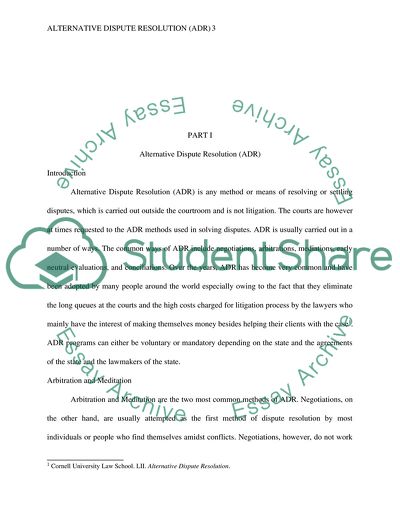Cite this document
(“Evaluate the purpose of Alternative Dispute Resolution (ADR) and, with Essay”, n.d.)
Evaluate the purpose of Alternative Dispute Resolution (ADR) and, with Essay. Retrieved from https://studentshare.org/law/1687095-evaluate-the-purpose-of-alternative-dispute-resolution-adr-and-with-particular-reference-to-the-services-provided-by-acas-assess-to-what-extent-it-is-a-successful-means-of-resolving-disputes-outside-the-formal-judicial-process
Evaluate the purpose of Alternative Dispute Resolution (ADR) and, with Essay. Retrieved from https://studentshare.org/law/1687095-evaluate-the-purpose-of-alternative-dispute-resolution-adr-and-with-particular-reference-to-the-services-provided-by-acas-assess-to-what-extent-it-is-a-successful-means-of-resolving-disputes-outside-the-formal-judicial-process
(Evaluate the Purpose of Alternative Dispute Resolution (ADR) And, With Essay)
Evaluate the Purpose of Alternative Dispute Resolution (ADR) And, With Essay. https://studentshare.org/law/1687095-evaluate-the-purpose-of-alternative-dispute-resolution-adr-and-with-particular-reference-to-the-services-provided-by-acas-assess-to-what-extent-it-is-a-successful-means-of-resolving-disputes-outside-the-formal-judicial-process.
Evaluate the Purpose of Alternative Dispute Resolution (ADR) And, With Essay. https://studentshare.org/law/1687095-evaluate-the-purpose-of-alternative-dispute-resolution-adr-and-with-particular-reference-to-the-services-provided-by-acas-assess-to-what-extent-it-is-a-successful-means-of-resolving-disputes-outside-the-formal-judicial-process.
“Evaluate the Purpose of Alternative Dispute Resolution (ADR) And, With Essay”, n.d. https://studentshare.org/law/1687095-evaluate-the-purpose-of-alternative-dispute-resolution-adr-and-with-particular-reference-to-the-services-provided-by-acas-assess-to-what-extent-it-is-a-successful-means-of-resolving-disputes-outside-the-formal-judicial-process.


